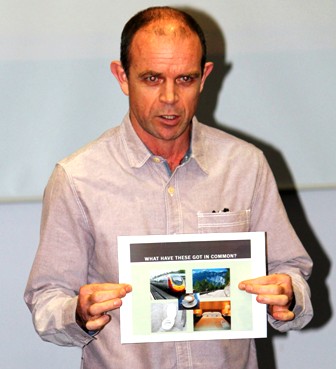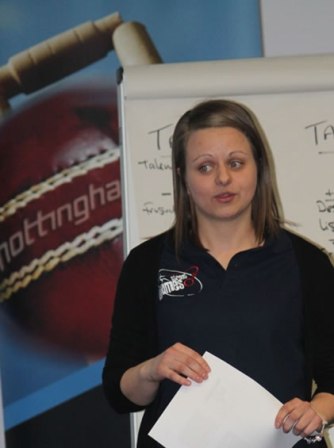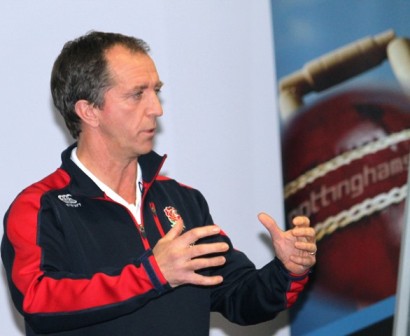
Richard Cheetham: proving an inspired choice
Are you inspired yet?
With every sporting agency attaching the word ‘inspiration’ to events, activity programmes and marketing campaigns The Leisure Review convened a Coaching Insight in Nottinghamshire to see what the word means to coaches in the post-Olympic landscape.

Richard Cheetham: proving an inspired choice
If The Leisure Review had a pound for every politician or marketing man who had used the word ‘inspiration’ since the Olympic and Paralympic carnival left town we would rival Croesus. Following the Games’ marketing department declaring that they would “inspire a generation”, the “legacy” – that other over-used word attached to the five-ringed circus – has been spoken of in terms, almost exclusively, of inspiration.
Having considered the proposition that inspiration was part of the coaching role in a pre-Games Coaching Insight, we decided to revisit the premise, if not the venue, for a spot of post-Games reflection. Instead of Hatfield and the tender ministrations of Rob Hardwick and the Herts Sports Partnership we threw ourselves on the hospitality of Pete Forster at Coaching Nottinghamshire and convened a group of local coaches for a discussion of inspiration, where it comes from and what part it has in coaching for legacy – another new concept we all seem to have to get to grips with.
When a word becomes ubiquitous it loses its impact and much of its meaning, especially when the bulk of the overuse is promulgated by politicians. George Orwell spent most of Animal Farm and much of 1984 discussing this premise. Quite whether ‘inspiration’ has become doublespeak for ‘same old product but now in a shiny cover’ might be moot but asking Richard Cheetham of the University of Winchester to reconsider the word both academically and practically as a way of opening the discussion proved, believe it or not, an inspired decision.
Cheetham approached a complex subject with disarming simplicity, showing a clip of Ellie Simmonds, the Paralympic swimme, being interviewed poolside having just won a gold medal. “I can’t wait to see my coach,” she gushed, “and thank him.” For Cheetham this was the ultimate ‘smiley face’, the epitome of positive performer feedback and spoke volumes for the power of coaching.
In a bid to better understand how inspirational moments like that can occur his first stop was the dictionary, where ‘to inspire’ means “to stimulate to activity or to creativity”. For him, this is also a definition of coaching with the coach being “a person that causes this state”. Having used one book, he then turned to another to make the point that what he was propounding was not just him voicing an opinion. In 2004 in the journal Psychology of Sport and Exercise two chaps called Mallett and Hanrahan wrote: “At all levels of sports participation, the coach is considered the architect of the motivational climate”; and if the climate is to be inspirational it follows that the coach must deliver it.
To illustrate the power of the coach when it comes to motivation and inspiration he introduced his “concept of POP”. This is the sound you get when a child’s bubble of enthusiasm is burst. This sound, which Cheetham associates with “the man with a bag of balls” style of coach, is the mismatch between what the child expected of their involvement in sport and what they are served up.
There are many, many kids getting involved in sports and only very few can be winners. Good coaches motivate all performers, not just the winners, and Cheetham spoke of a coach who 35 years ago provided an inspiration for his 12-year-old self. Selwyn Brough was the man’s name and the occasion was a cross-country race in which Cheetham finished 57 out of 360 starters. This was hardly world-beating stuff but Brough sought him out and said, “Well done, Richard.” This supportive remark at a crucial time was the antithesis of POP and Mr Brough’s intervention has lived with Cheetham ever since. Indeed he was so inspired that he recently contacted his old teacher and thanked him, an exercise he challenged anyone who had been affected by a former coach to consider.
The second speaker to engage with the 30 coaches in the room was Nick Scott of the Rugby Football Union. He works in the game development department of that governing body and has as his remit the development of coaching systems which will allow the RFU to capitalise fully on hosting the 2015 world cup. One of the key performance indicators for those working to deliver the event is a sustained increase in participation. When England last became world champions in 2003 the immediate increase in participants was not sustained and in fact playing numbers went down in the long term. This is not to happen post-2015 and Scott’s part of delivering the promise is developing inspirational coaches. If he is going to achieve that he needs to empower others.
The first step has been to broaden the definition of coaching and broaden the definition of the word ‘coach’. Scott cited Carwyn James as the first rugby coach, a man who inspired “complete rugby performance”, a man whose approach was then copied, codified and systematised into coaching degree courses until the system had, Scott suggested, “taken the romance and fun out of the game”. Scott is going to put it back.
His plan – and it was a plan laid as far back as 2011 – is to change the way the RFU trains its workforce. Instead of tactics and technical skills, the budding rugby coach is now exposed to units on the social and personal development of children. They are encouraged to ignore their coaching role models, who were the fount of all knowledge and decision-making, and instead seek to develop the whole child by putting them at the centre of the process.
Those in the room familiar with David Haskins’ C-system nodded along as Scott ran through the implications for coaches in adopting the new approach. They did the same when he suggested that “employers and deployers of coaches” exacerbate the problems caused by an unenlightened approach. He also spoke of the challenge of culture change facing his game.
When it comes to culture change and culture shock Claire Lane, who has recently left the traditional world of a county sports partnership for the rather more sharp-edged environment in which StreetGames operates, has first-hand experience of both. Describing herself as a “nice, middle-class netball coach whose players say please and thank you and want to be there”, she admits to being taken aback when she met the “gangs of kids”, whose lives are chaotic and often violent, that make up much of the StreetGames client group.
Using her own experience as a guide, she led an audience drawn almost in its entirety from the ranks of coaches who service the needs of national governing body clubs and squads into the world of the “disadvantaged” young people her organisation targets. StreetGames works to support national governing bodies of sport (NGBs) develop versions of their sports that will engage and enthuse young people from disadvantaged communities. Pictures of volleyball being played under a flyover and a young woman playing soccer with a handbag on her shoulder challenged the coaches in the room to understand the lives of the young people who access “doorstep sport” just as NGBs have been challenged to make their offer more flexible.
Many NGBs have made significant progress on this agenda over the past two years and, with the funding for StreetGames coming now straight from Sport England, many have bought into the process of increasing their participation figures by extending their game’s reach. One image on Lane’s presentation spoke volumes: a car park transformed into a street golf course with tarmac, wheelie bins and skips standing in for fairway, holes and bunkers. Lane explained that while golf clubs might be persuaded to open their gates to the StreetGames audience, not many young people would take up the invitation without a period of additional support from community workers to aid their transition; they would feel too intimidated by traditional venues and their traditional occupants.
Lane also showed images of the types of people who work as coaches on StreetGames projects, young men and women who epitomise the player-centred approach and whose intervention can inspire the young people they work with to “dare to dream”, and support them to stay away from potential pitfalls within their neighbourhoods. She showed part of a video made by young boys who attend a project which the authorities doubtless dub “diversionary”. One young man rapped, “This place is my medicine” and it would have taken a hard man indeed not to be affected.
The short discussion that concluded the evening revealed that there were some hard men in the room, mostly from the sport of swimming, but there were also some coaches who had been educated, some who had been moved and even some who had been inspired.
Whether one evening is enough to inspire the transformational change that turns sports coaches into people coaches is debatable but one coach in the room at least followed Richard Cheetham’s example and Googled, contacted and thanked a former coach. So the event did have one positive effect. It would be warming to think it had more.
The Leisure Review, April 2013
© Copyright of all material on this site is retained by The Leisure Review or the individual contributors where stated. Contact The Leisure Review for details.
![]() Download a pdf version of this article for printing
Download a pdf version of this article for printing

Claire Lane: moving into a new world

Nick Scott: putting the fun back into the sport of rugby